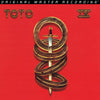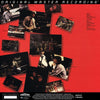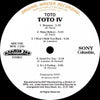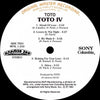









Toto IV (200g, Half Speed Mastering)
ORDER LIMITED TO ONE ITEM PER CUSTOMER
[click here to see more vinyl featuring Toto]
Steve Porcaro, David Paich (keyb, voc); Steve Lukather (g, voc); Bobby Kimball (voc); David Hungate (b); Jeff Porcaro (dr, perc)
Written by : David Paich (A1, A2, B1, B2, B3, B4, B5), Bobby Kimball (A2, A4), Steve Lukather (A2, A3, A4, B1), Steve Porcaro (A4, A5, B1), Jeff Porcaro (B3, B5), Bobby Kimball (B4)
1 LP, standard sleeve
Limited edition
Original analog Master tape : YES
Half Speed Mastering
Heavy Press : 200g SuperVinyl
Record color : black
Speed : 33 RPM
Size : 12'’
Stereo
Studio
Record Press : unspecified
Label : MOFI
Original Label : Columbia
Recording: 1982 at Sunset Sound, Los Angeles, by David Leonard, Peggy McCreary & Terry Christian and Record One, Los Angeles, by Jamie Ledner, Niko Bolas & Lon LeMaster
Engineered by Al Schmitt, Greg Ladanyi, Tom Knox
Mixed by Greg Ladanyi
Produced byToto
Mastered by George Marino
Originally released in 1982
Reissued in February 1996
Tracks :
Side A :
- Rosanna
- Make Believe
- I Won't Hold You Back
- Good For You
- It's A Feeling
Side B :
- Afraid Of Love
- Lovers In The Night
- We Made It
- Waiting For Your Love
- Africa
Reviews :
« It was do or die for Toto on the group's fourth album, and they rose to the challenge. Largely dispensing with the anonymous studio rock that had characterized their first three releases, the band worked harder on its melodies, made sure its simple lyrics treated romantic subjects, augmented Bobby Kimball's vocals by having other group members sing, brought in ringers like Timothy B. Schmit, and slowed down the tempo to what came to be known as "power ballad" pace. Most of all, they wrote some hit songs: "Rosanna," the old story of a lovelorn lyric matched to a bouncy beat, was the gold, Top Ten comeback single accompanying the album release; "Make Believe" made the Top 30; and then, surprisingly, "Africa" hit number one ten months after the album's release. The members of Toto may have more relatives who are NARAS voters than any other group, but that still doesn't explain the sweep they achieved at the Grammys, winning six, including Album of the Year and Record of the Year (for "Rosanna"). Predictably, rock critics howled, but the Grammys helped set up the fourth single, "I Won't Hold You Back," another soft rock smash and Top Ten hit. As a result, Toto IV was both the group's comeback and its peak; it remains a definitive album of slick L.A. pop for the early '80s and Toto's best and most consistent record. Having made it, the members happily went back to sessions, where they helped write and record Michael Jackson's Thriller. » AllMusic Review by William Ruhlmann
Anyone who gives the dull name “Four” to their rock album must either be very sure of success or already have resigned. The group Toto may well have experienced such extremes as there was an enormous cleft between their amazing financial success and the crushing negative opinions voiced by the critics. Billboard criticised the superficial lyrics as being void of any sort of emotional weight while the Los Angeles Times aimed their fire at the musicians themselves, slamming them as dubious artists with a commercialised mentality.
To this Toto struck back with their fourth album, which was an unparalleled success and brought them six Grammy awards. For a whole ten months "Africa" reigned at Number 1 on the charts and together with the super-hit "Rosanna" the two smash hits were a constant presence, backed up by a collection of impressive rock classics. A trip to the record shop is all that is needed to prove that this is unlikely to change in the near future. The bright red cover with its depiction of a sword will catch your eye, as though saying: It’s got to be the Fourth!
Half-speed mastering. In half-speed mastering, the whole process is slowed down to half of the original speed. A typical 33 1/3 rpm record is cut at 16 2/3 rpm. The source material is also slowed down (reducing the pitch in the process) meaning the final record will still sound normal when played back. Slowing the whole process down allows more time, which means the end result sounds better and is more efficient — allowing engineering to minimize the effects of inherent limitations within the vinyl format. The result is a more accurate and more open high-frequency response in the half speed vinyl when compared with a normal speed recording.
Ratings :
Allmusic : 4.5 / 5 , Discogs :

